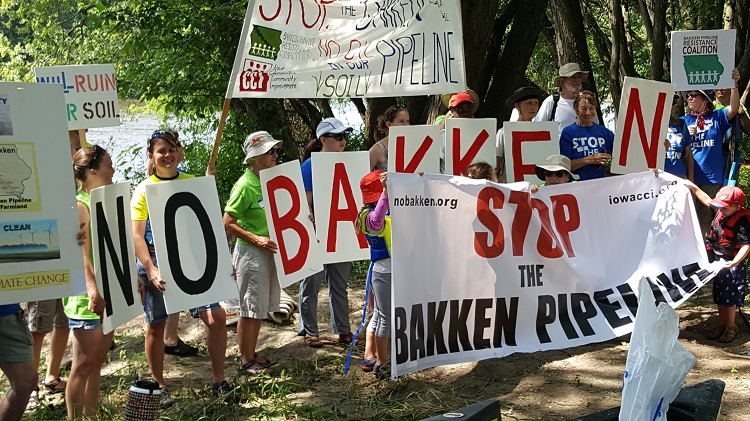
Some 75 opponents of the Bakken oil pipeline attended Saturday’s morning launch of a canoe and kayak protest flotilla on the Des Moines River near Pilot Mound in Boone County.
The Bakken Pipeline Resistance Coalition sponsored the protest flotilla in part to protest of the Iowa Utilities Board recent approval of the project and educating citizens about the long-term environmental risks posed by the 1,200-mile pipeline project.
A rally and press conference was held prior to the launch at the Norton’s Ford Access boat ramp on the Des Moines River, about two miles upstream from where the proposed Bakken underground pipeline, also known as the Dakota Access pipeline, will pass under the river.
Paddlers spent about several hours on the water before meeting for food, music and fellowship at the Pilot Mound Community Center. Pilot Mound Mayor Leda Burton addressed the crowd at the rally, telling the crowd the pipeline company “has never called to assure me this pipeline will not pose a risk to our town’s wells.”
Mark Edwards of Boone, who retired after 30 years with the Iowa Department of Natural Resources (DNR) as a trails coordinator, is a leading opponent of the pipeline in Boone County.
“How can a proposed hiking trail less than a 100 feet long get more oversight and closer scrutiny than this hazardous 1,172 mile long pipeline?” Edwards said. “At the current proposed pumping rate, one spill could dump 1 million gallons per hour into our tile systems or water bodies. The pipeline will be monitored electronically from Sugarland, Texas, or by flyovers once every 10 days.”
Other speakers at the press conference were Carolyn Raffensperger of Ames, executive director of the Science and Environmental Health Network, and Angela Carter of Davenport, spokesperson for the Women, Food and Agriculture Network.
Danielle Wirth, a professor of environmental science and policy at Drake University, Iowa State University the the Des Moines Area Community College, said most spills are only discovered by local landowners when lakes of toxic crude well up in their fields.
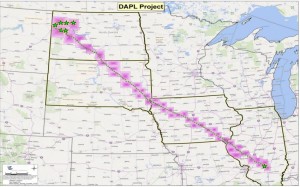
“Here is why the pipeline will eventually fail,” Wirth said. “Metal pipe, unarmored and exposed to Iowa’s complex soil microbes and minerals, will elicit a weak electric current between charged soil particles — called ions — and the metal piping. The electrical current will wear out the metal and create small holes and fissures. Small failures become larger over time.”
The Iowa Utilities Board in March authorized Texas-based Dakota Access LLC to begin construction of the $3.8 billion underground pipeline on lands outside the jurisdiction of the U.S. Army Corps of Engineers, which is still considering issuing permits for the water crossings.
The Bakken Pipeline Resistance Coalition is calling on the U.S. Army Corps of Engineers to conduct a comprehensive environmental impact study on the proposed Bakken fracked-oil pipeline and to deny the pipeline permit.
Wally Taylor, legal chair of the Sierra Club Iowa Chapter, said the Army Corps’ Nationwide Permit 12, which governs utility lines, exempts the Bakken project from the need to conduct an environmental impact assessment.
“But the Corps is still hung up on some archaeological stuff,” Taylor said, particularly the Native American burial sites found along the length of the proposed pipeline route.
“The state archaeologist says the pipeline is deep enough that it won’t disturb burials nearer the surface,” Taylor said, “but Native American are saying no and that they will disturb their sacred burial grounds.”
Taylor said the state agencies with a hand in the pipeline project — the Iowa Utilities Board, the Iowa DNR and the office of the State Archaeologist of Iowa — have been packed with political appointees hand-picked by Iowa Gov. Terry Branstad.
“Branstad micromanages these agencies and boards and commissions,” Taylor said, “and he only appoints people like himself, who are subservient to the interests of big business and industrial agriculture.”
The pipeline would pass through 18 Iowa counties, including passing under both the Missouri and Mississippi rivers, in its passage from oil fields in North Dakota to a transport hub in Illinois.
If you like ThePerryNews.com’s coverage of environmental issues, then please consider making a one-time donation or a becoming a recurring supporter at $5 per month.









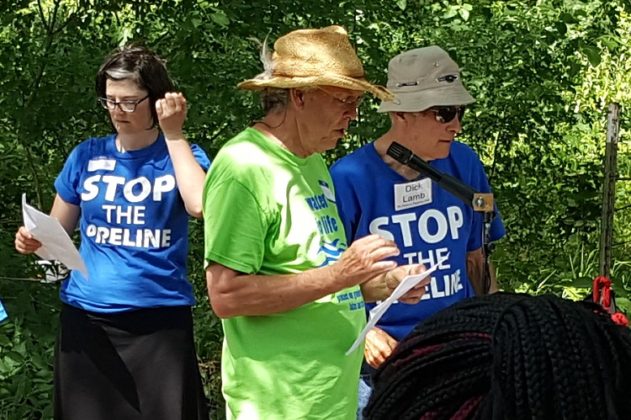
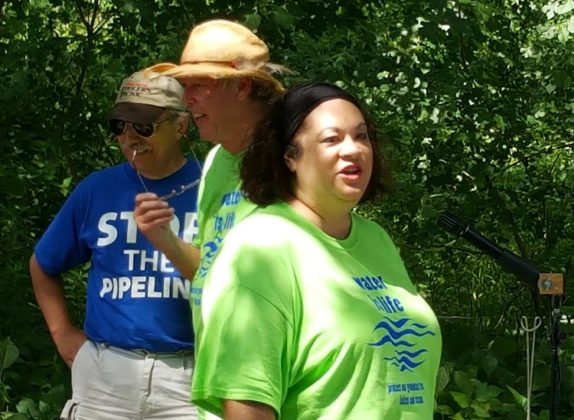
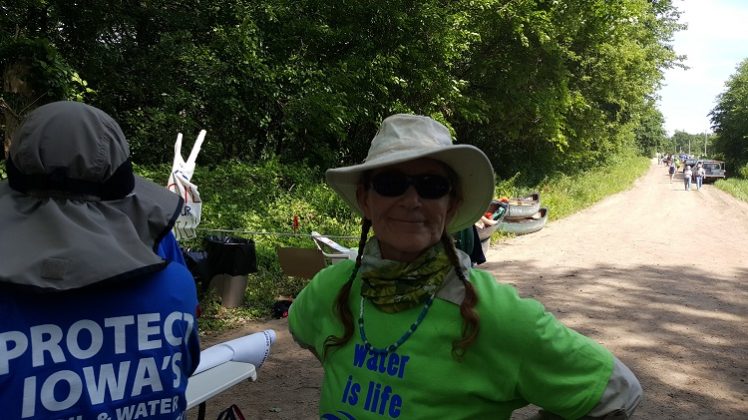
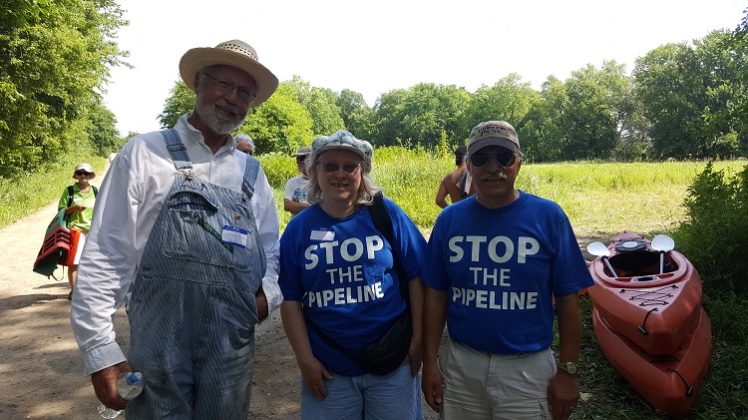
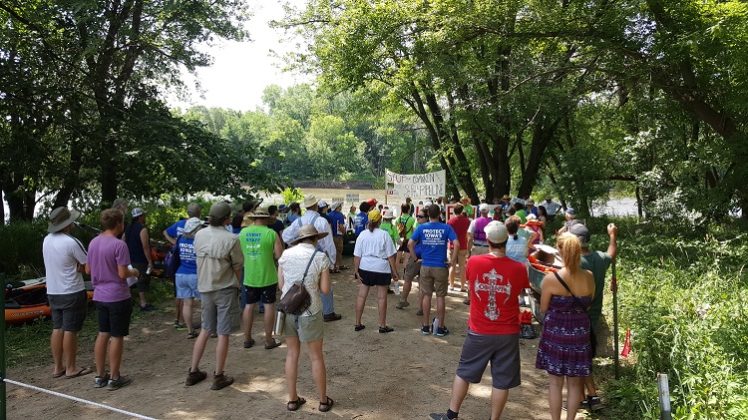
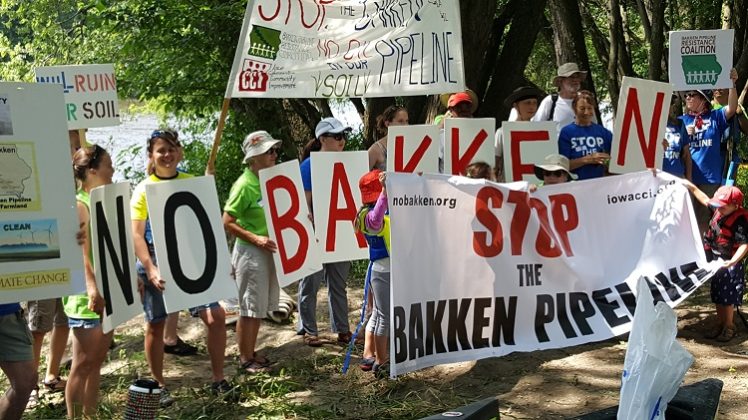
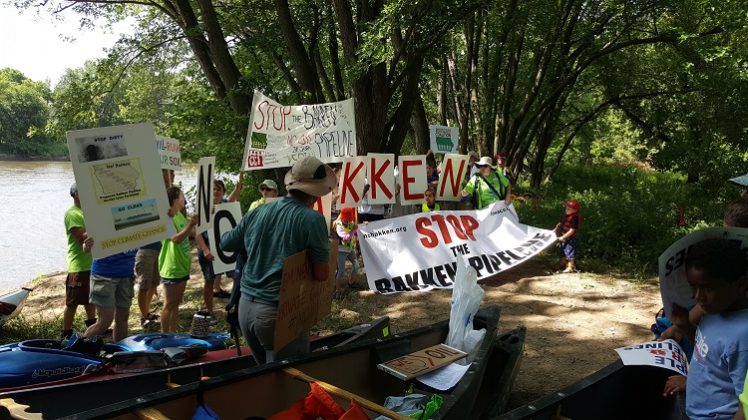
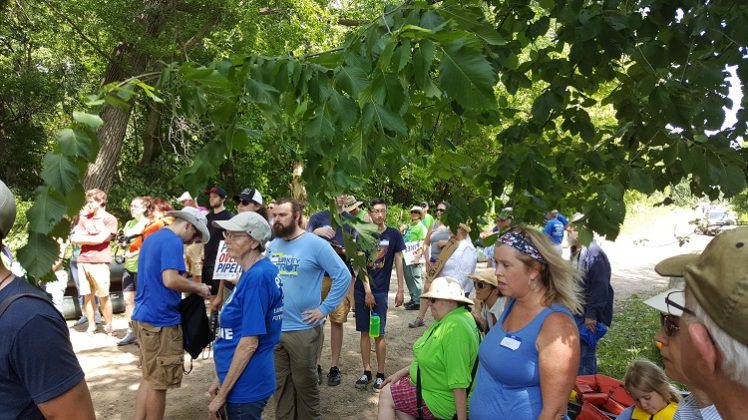
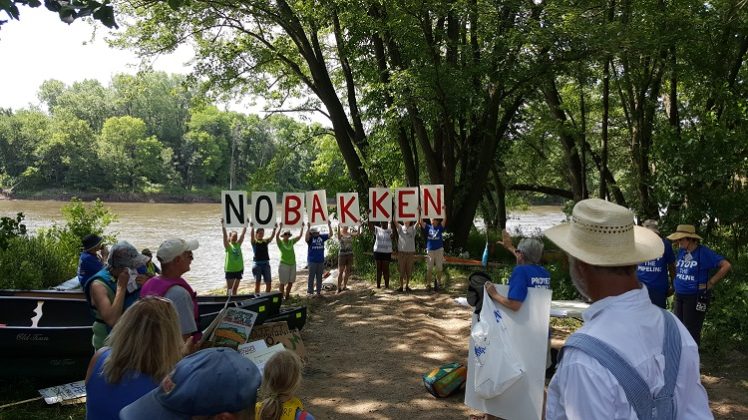








Jim, I am so sorry I didn’t recognize you there. I seemed to be floating above it all in a dream as so many people showed up, and I was so overwhelmed by their spirit. Thank you for being there and for covering it so well. You really caught the spirit of the event by calling it “education and activism.” I usually paddle alone, and it was just so amazing to be part of that group. Looking forward to our paths crossing again and hopefully very soon.
Thanks, Mark. It was a great turnout, I thought, which speaks to the importance of the issue.
I could not attend but thank the supporters and leaders of this movement (and the reporter for this fine article). As executive director of the Iowa Wildlife Center, I’m acutely aware of the impact such a project can have on wildlife during construction (for example, we received a call saying that an active mink den was directly in the path of construction) and after construction (I followed the pipeline disaster of the the Kalamazoo River a few years ago). This is a project with potentially huge negative, long-laying and costly impacts.
Thank you for the good article, Jim. I think we had 40 boats on the water.
Lee Tesdell, Slater
Thanks for the info, Lee. Sorry I couldn’t stay longer.
Note: The Advisory Board for Iowa’s Office of the State Archaeologist is emphatically NOT appointed by Governor Branstad or any of his political cronies as this article states. Appointments are made on the basis of professional qualifications by the University of Iowa under whose aegis the OSA exists by law. I know this, having been on the OSA Advisory Board since the 1970s. David M. Gradwohl, Professor Emeritus of Anthropology and Founding Director of the Iowa State University Archaeological Laboratory.